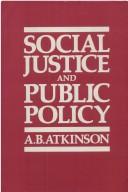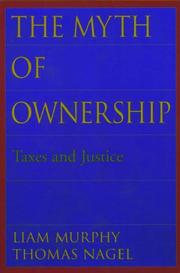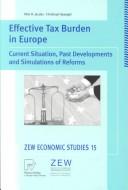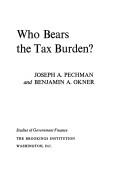| Listing 1 - 10 of 29 | << page >> |
Sort by
|
Book
Year: 1971 Publisher: Detroit: Wayne state university press,
Abstract | Keywords | Export | Availability | Bookmark
 Loading...
Loading...Choose an application
- Reference Manager
- EndNote
- RefWorks (Direct export to RefWorks)
Book
ISBN: 9780387511313 0387511318 Year: 1989 Publisher: Berlin: Springer,
Abstract | Keywords | Export | Availability | Bookmark
 Loading...
Loading...Choose an application
- Reference Manager
- EndNote
- RefWorks (Direct export to RefWorks)
Tax incidence --- Tax incentives --- Equilibrium (Economics) --- Welfare economics

ISBN: 9780262010672 0262010674 Year: 1983 Publisher: Cambridge (Mass): MIT Press,
Abstract | Keywords | Export | Availability | Bookmark
 Loading...
Loading...Choose an application
- Reference Manager
- EndNote
- RefWorks (Direct export to RefWorks)
Distributive justice --- Income distribution --- Tax incidence --- Finance, Public --- Economic policy
Book
ISBN: 2757891065 9782757891063 Year: 2021 Publisher: Paris: Seuil,
Abstract | Keywords | Export | Availability | Bookmark
 Loading...
Loading...Choose an application
- Reference Manager
- EndNote
- RefWorks (Direct export to RefWorks)
La 4e de couverture indique : "Pour la première fois depuis plus d’un siècle, les milliardaires américains paient moins d’impôts, en proportion de leurs revenus, que chacun des autres groupes sociaux. Écrit par deux économistes qui ont révolutionné l’étude des inégalités, ce livre présente une analyse au scalpel de cette grande transformation. Mêlant récit historique et analyse économique, Emmanuel Saez et Gabriel Zucman analysent les choix (et non-choix) qui ont conduit au triomphe de cette injustice fiscale, de l’exonération progressive des revenus du capital au développement d’une nouvelle industrie de l’évasion fiscale, en passant par l’engrenage de la concurrence fiscale internationale. Avec clarté et concision, ils expliquent comment l’Amérique, qui a été à la pointe du combat pour la justice fiscale pendant la moitié du xxe siècle, a tourné le dos à sa propre tradition. Si l’on veut éviter que l’Europe ne s’enfonce dans la dérive inégalitaire et oligarchique qui a amené Donald Trump au pouvoir, il y a urgence à tirer les leçons de cette histoire. Car même si ce phénomène a été extrême de l’autre côté de l’Atlantique, le déclin de la progressivité fiscale dans un contexte de montée des inégalités n‘est en rien spécifique aux États-Unis, et appelle des solutions globales. Le Triomphe de l’injustice propose une refondation de l’impôt à la fois visionnaire et pragmatique, à même d’apporter des solutions concrètes aux défis inégalitaires contemporains et de réconcilier la mondialisation et la justice économique."
Rich people --- Tax incidence --- Income distribution --- Taxation --- Equality

ISBN: 0195176561 0195150163 0199833923 9786610482115 0198034199 1280482117 0195303156 9780199833924 0199882142 9780195176568 Year: 2002 Publisher: New York : Oxford University Press,
Abstract | Keywords | Export | Availability | Bookmark
 Loading...
Loading...Choose an application
- Reference Manager
- EndNote
- RefWorks (Direct export to RefWorks)
In a capitalist economy, taxes are the most important instrument by which the political system puts into practice a conception of economic or distributive justice. This book aims to bring together the philosophical discussions of justice with the complex debates about tax policy that go on in practical politics, in economics, and in law.
Tax incidence --- Taxation --- Distributive justice --- Social aspects --- Duties --- Fee system (Taxation) --- Tax policy --- Tax reform --- Taxation, Incidence of --- Taxes --- Finance, Public --- Revenue --- Tax incidence - United States. --- Distributive justice - United States. --- Taxation - Social aspects - United States.
Book
ISBN: 1849461236 9781849461238 Year: 2011 Publisher: Oxofrd: Hart,
Abstract | Keywords | Export | Availability | Bookmark
 Loading...
Loading...Choose an application
- Reference Manager
- EndNote
- RefWorks (Direct export to RefWorks)
Canada --- Etats-Unis --- Royaume-Uni --- Allemagne --- Australie --- Suède --- Kenya --- Espagne --- Tax incidence --- Women --- Fiscal policy --- Sex discrimination --- Fiscal policy

ISBN: 3790814709 3642510361 9783790814705 Year: 2002 Volume: 15 Publisher: Heidelberg Physica
Abstract | Keywords | Export | Availability | Bookmark
 Loading...
Loading...Choose an application
- Reference Manager
- EndNote
- RefWorks (Direct export to RefWorks)
Our small book presents areport which has been prepared in the year 2000 for the Taxation and Custorns Union Directorate General of the European Commission, under contract no. T AXUD / 00 / 312. Some of the results form part of the report "Company Taxation in the Internal Market" of the Commission Services released in autumn 2001. We present estimates of effective average tax rates (EATR) in five EU Member States (France, Germany, Ireland, the Netherlands and the UK) plus the USA based on the European Tax Analyzer approach. The European Tax Analyzer is a computer based model firm approach for the computation and comparison of international company tax burdens. It has been developed in co-operation with the Centre for European Economic Research (ZEW). We would like to thank the ZEW for this co-operation. Furthermore, we gratefully acknowledge the help and advice of Gerd Gutekunst, Rieo A. Hermann and Thorsten Stetter in preparing the report. Special mention must be made of Gerd Gutekunst, who was also responsible for preparing the printed version of this report.
Tax incidence --- EEC / European Union - EU -Europese Unie - Union Européenne - UE --- 336.204 --- weerslag, invloed, last en verdeling van de belasting. --- Tax accounting. --- Tax laws. --- Public finance. --- Business Taxation/Tax Law. --- Public Economics. --- Cameralistics --- Public finance --- Public finances --- Currency question --- Tax laws --- Tax legislation --- Tax regulations --- Taxation --- Finance, Public --- Law --- Accounting --- weerslag, invloed, last en verdeling van de belasting --- Tax incidence - European Union countries. --- Tax incidence - United States.

ISBN: 0815769687 0815769679 9780815769675 9780815769682 Year: 1974 Publisher: Washington, DC : Brookings Institution,
Abstract | Keywords | Export | Availability | Bookmark
 Loading...
Loading...Choose an application
- Reference Manager
- EndNote
- RefWorks (Direct export to RefWorks)
Taxes --- Income --- United States --- Taxation --- Tax incidence --- fiscalite --- tarifs fiscaux --- eua --- fiscaliteit --- belastingtarieven --- vsa --- US / United States of America - USA - Verenigde Staten - Etats Unis --- 336.204 --- 336.2 --- -Incidence of taxation --- Tax burden --- Tax equity --- Tax shifting --- weerslag, invloed, last en verdeling van de belasting. --- Belastingsakkoorden. Belastingswezen --- -weerslag, invloed, last en verdeling van de belasting. --- 336.2 Belastingen. Belastingswezen. Openbare financien. Belastingspolitiek. Belastingstheorie. Belastingsharmonisatie. Fiskale politiek. Belastingsleer. Belastingsdruk. Belastingstechniek. Belastingsstelsel.Belastingstarief --- 336.2 Belastingsakkoorden. Belastingswezen --- Belastingen. Belastingswezen. Openbare financien. Belastingspolitiek. Belastingstheorie. Belastingsharmonisatie. Fiskale politiek. Belastingsleer. Belastingsdruk. Belastingstechniek. Belastingsstelsel.Belastingstarief --- weerslag, invloed, last en verdeling van de belasting --- Taxation - United States --- Tax incidence - United States. --- United States of America --- -Tax incidence --- -Tax incidence -
Book
ISBN: 9780190251512 0190251514 Year: 2015 Publisher: New York, NY : Oxford University Press,
Abstract | Keywords | Export | Availability | Bookmark
 Loading...
Loading...Choose an application
- Reference Manager
- EndNote
- RefWorks (Direct export to RefWorks)
"Rich people stash away trillions of dollars in tax havens like Switzerland, the Cayman Islands, or Singapore. Multinational corporations shift their profits to low-tax jurisdictions like Ireland or Panama to avoid paying tax. Recent stories in the media about Apple, Google, Starbucks, and Fiat are just the tip of the iceberg. There is hardly any multinational today that respects not just the letter but also the spirit of tax laws. All this becomes possible due to tax competition, with countries strategically designing fiscal policy to attract capital from abroad. The loopholes in national tax regimes that tax competition generates and exploits draw into question political economic life as we presently know it. They undermine the fiscal autonomy of political communities and contribute to rising inequalities in income and wealth. Building on a careful analysis of the ethical challenges raised by a world of tax competition, this book puts forward a normative and institutional framework to regulate the practice. In short, individuals and corporations should pay tax in the jurisdictions of which they are members, where this membership can come in degrees. Moreover, the strategic tax setting of states should be limited in important ways. An International Tax Organisation (ITO) should be created to enforce the principles of tax justice. The author defends this call for reform against two important objections. First, Dietsch refutes the suggestion that regulating tax competition is inefficient. Second, he argues that regulation of this sort, rather than representing a constraint on national sovereignty, in fact turns out to be a requirement of sovereignty in a global economy. The book closes with a series of reflections on the obligations that the beneficiaries of tax competition have towards the losers both prior to any institutional reform as well as in its aftermath"-- "Tax competition between states is what Peter Dietsch refers to in his title as "catching capital." In particular, he sees several forms of tax competition -- for portfolio capital, meaning holdings by wealthy private individuals; for the profits of multinational corporations; and for foreign direct investment, where actual economic activity is attracted. Peter Dietsch's book examines two central questions that stem from this situation. Is there anything ethically wrong about tax competition? And if there is, what should be done about it? Under the current system a lot of capital simply slips through the net; the loopholes caused by current tax competition mean that states do not capture the taxes they are entitled to. And as Thomas Piketty has argued, the vast increase in economic inequality stems in part from the ability of the rich to hide their wealth in this way. Given these moral issues, Dietsch argues that there is a pressing need for the global community to structure international fiscal policy to plug these loopholes. But how should it do so? Will the fiscal sovereignty of states be compromised? Can we regulate tax competition without being forced to harmonize all tax rates? How do we strike a balance between the autonomy of one state and the problems it creates for others? Should winners of tax competition compensate the losers? Finally, is regulating tax competition simply inefficient from an economic perspective? in answering these questions, Peter Dietsch advances and defends his own new global regulatory framework for tax competition"--
Tax law --- International law --- Taxation --- Tax incidence --- Fiscal policy --- Tax havens --- Moral and ethical aspects --- Taxation. --- Tax incidence. --- Fiscal policy. --- Tax havens. --- PHILOSOPHY / Political. --- POLITICAL SCIENCE / History & Theory. --- BUSINESS & ECONOMICS / International / Taxation. --- Moral and ethical aspects. --- Impôt --- Impôt --- Politique fiscale --- Paradis fiscaux --- Aspect moral --- Incidence --- Taxation - Moral and ethical aspects --- Philosophy / Political.
Book
ISBN: 0871542277 9780871542274 Year: 1994 Publisher: New York (N.Y.): Russell Sage Foundation
Abstract | Keywords | Export | Availability | Bookmark
 Loading...
Loading...Choose an application
- Reference Manager
- EndNote
- RefWorks (Direct export to RefWorks)
330.564 <73> --- Verdeling van nationaal inkomen. Inkomensverdeling--Verenigde Staten van Amerika. VSA. USA --- 330.564 <73> Verdeling van nationaal inkomen. Inkomensverdeling--Verenigde Staten van Amerika. VSA. USA --- Income --- Income distribution --- Wages --- Labor market --- Tax incidence --- United States --- Economic conditions --- Income - United States --- Income distribution - United States --- Wages - United States --- Labor market - United States --- Tax incidence - United States --- United States - Economic conditions - 1981-2001
| Listing 1 - 10 of 29 | << page >> |
Sort by
|

 Search
Search Feedback
Feedback About UniCat
About UniCat  Help
Help News
News